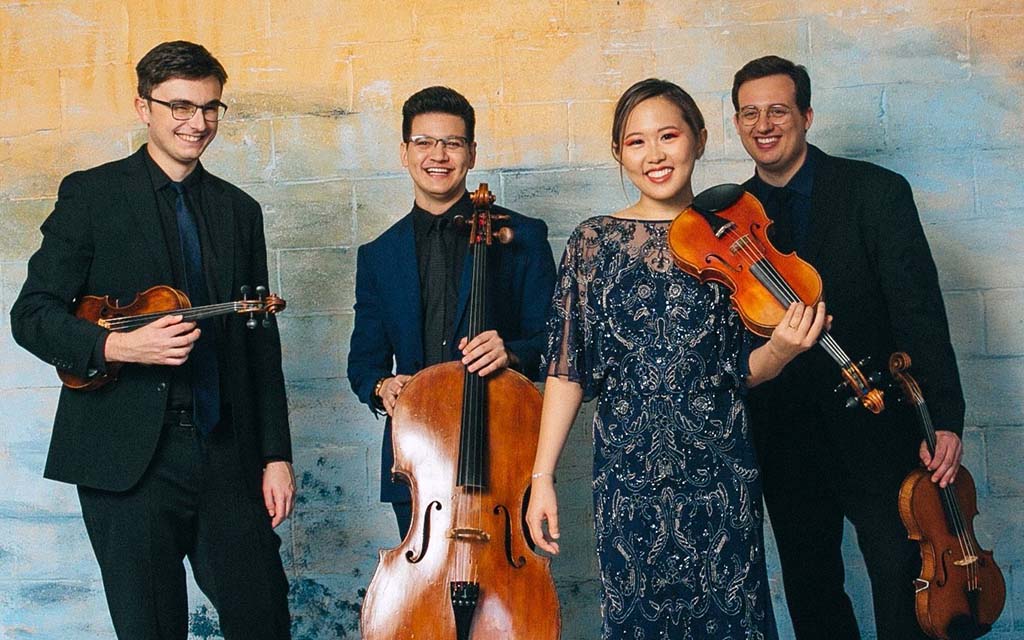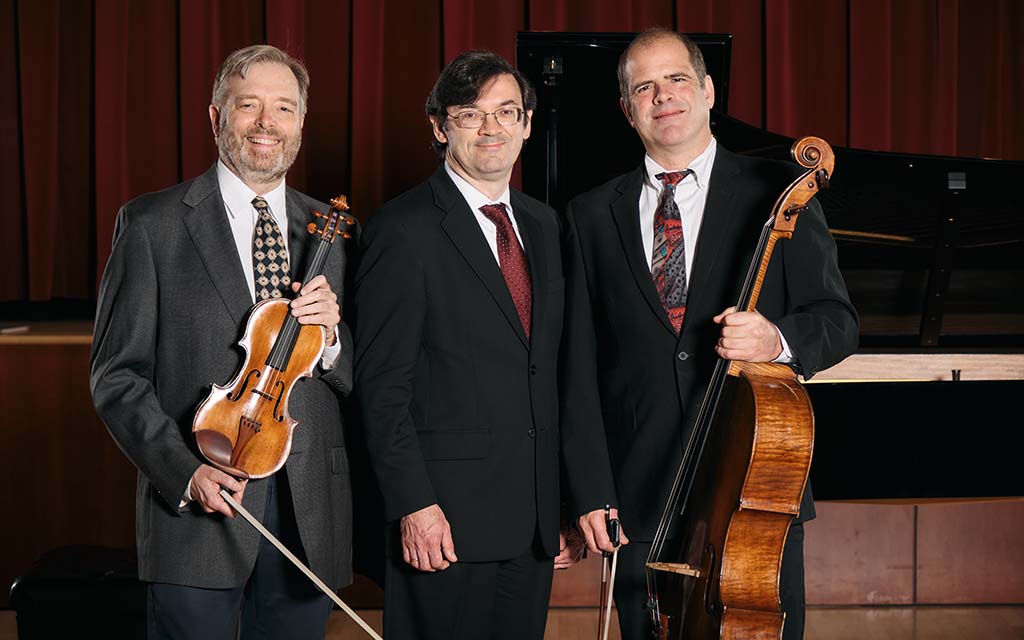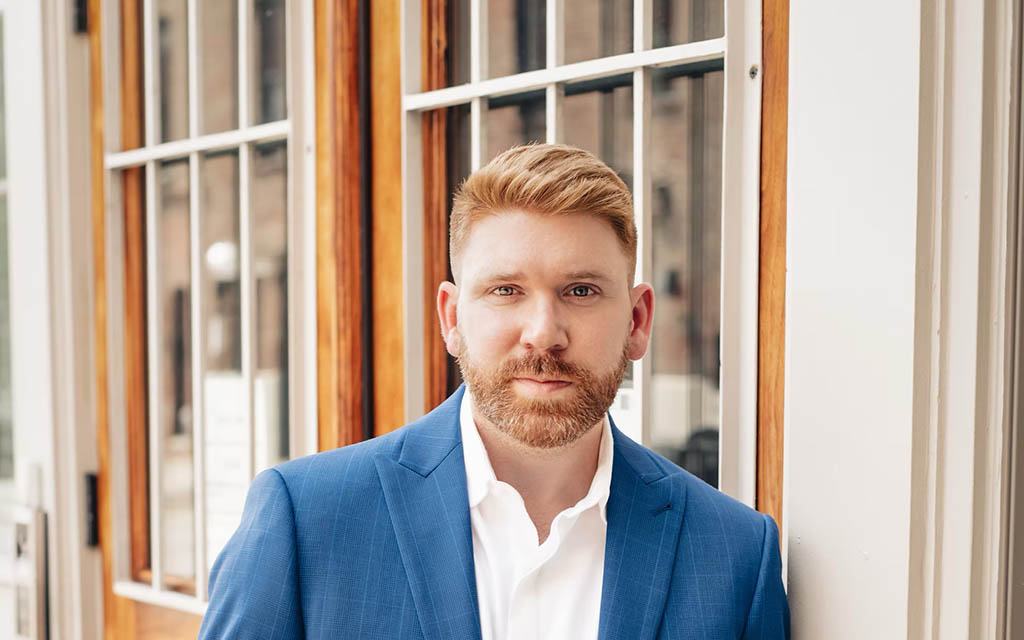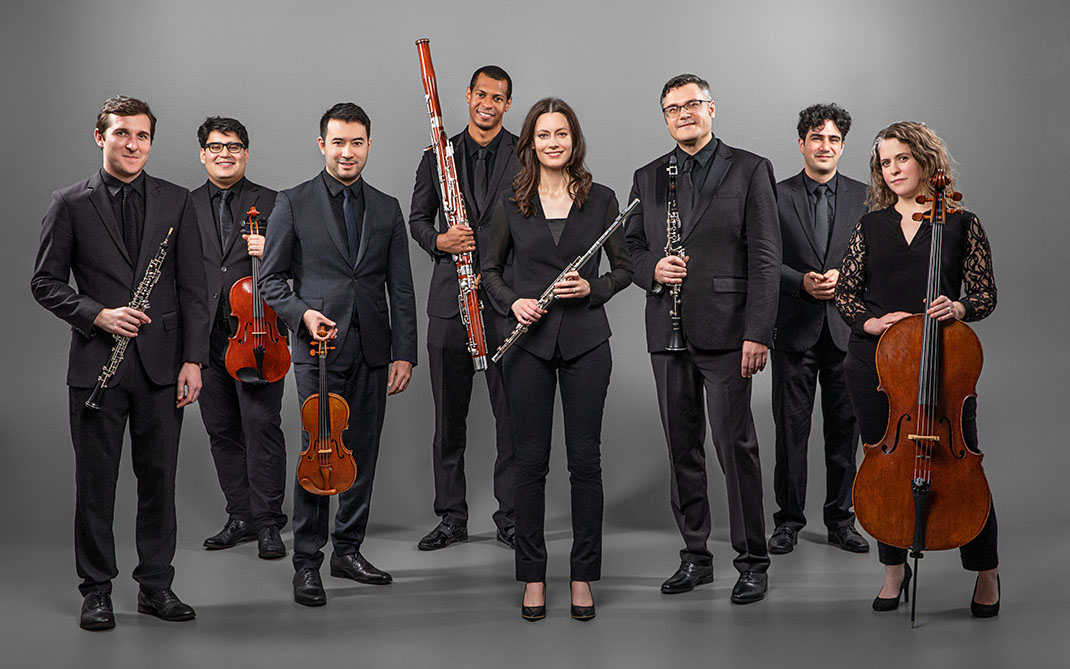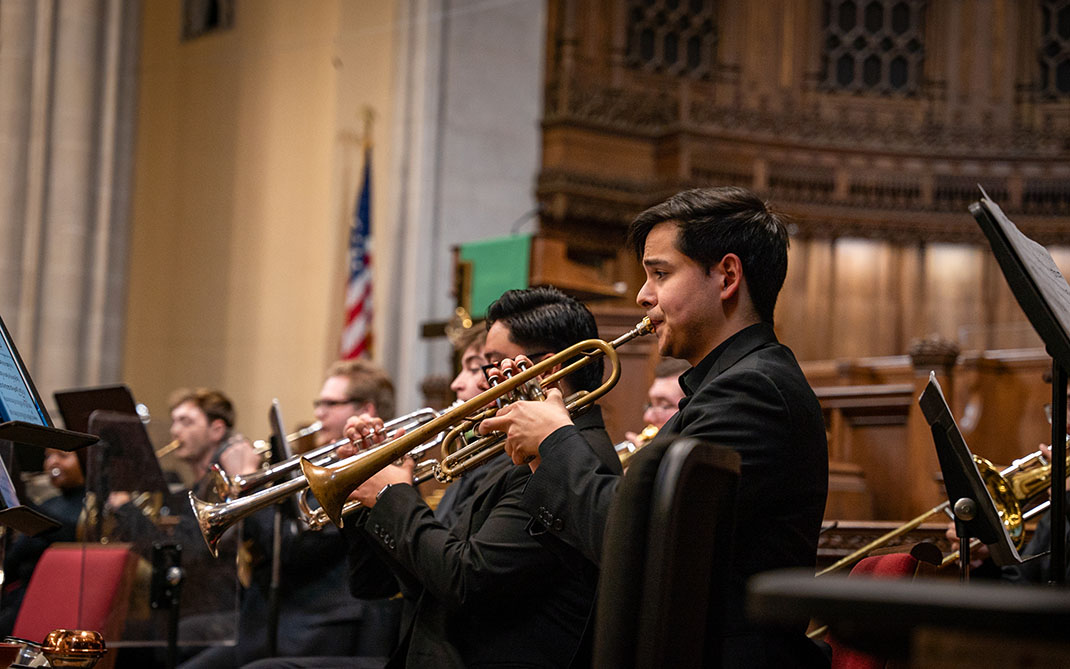Chatham Rabbits
Listen to the interview on Apple, Spotify, or your listening platform of choice. Captioned interviews are available on YouTube.
The views and opinions expressed by speakers and presenters in connection with Art Restart are their own, and not an endorsement by the Thomas S. Kenan Institute for the Arts and the UNC School of the Arts. This interview has been edited for length and clarity.
The year 2020 was looking to be a banner year for musical and life partners Sarah and Austin McCombie, aka Chatham Rabbits. They had just made the biggest financial investment in their band, namely the purchase of a tour van, and were looking forward to months of being on the road and performing to promote their second album when the pandemic hit and their bookings vanished.
What they did next, though, exemplifies their resourcefulness, generosity and innovative spirit. They installed solar panels on top of the van to power a sound system, hitched a flatbed trailer to their new vehicle and played free concerts in scores of neighborhoods around North Carolina. They called it the "Stay at Home Tour. In the middle of lockdown, when the prospect of hearing live music seemed years away, you could email Chatham Rabbits a request, and chances are they’d show up on your street and give you and your neighbors a joyful, free concert.
Happily, their professional life has resumed at full tilt. They recently completed their third album, titled “Be Real with Me,” which is scheduled for release on Valentine’s Day in 2025, and they will spend February and March performing in venues all over the country.
In this interview, Austin and Sarah describe how a commitment to community and authenticity has allowed them to keep taking risks and navigate a music industry that has yet to catch up to the needs of up-and-coming artists and their fans.
Pier Carlo Talenti: In the “On the Road” documentary about you that PBS aired a couple of years ago, each episode begins with your narration in which you state something to the effect of, “We had nine-to-five corporate jobs that we quit to pursue the music.” Which makes it sound like it was an easy decision. I want to dig down a little deeper, though. When did you know the moment was ripe for giving up that type of security and stability and pursuing your passion? Did you both agree on how and when that would happen?
Austin McCombie: Wow, that’s a great question. Sarah, do you want to take the first pass at that one?
Sarah McCombie: Yeah, I’d be happy to. I really appreciate that you bring this up because it was not an easy decision. In the documentary, we were trying to find a quippy way to bring people into the story, and so it just comes and goes as a passing comment, but actually that was a huge, huge moment for us, both interpersonally within our relationship and also just in our careers that we had been building up until that point.
I was working as a teacher at a Montessori school; Austin was a financial planner working under Northwestern Mutual. We were playing music as a hobby and for fun, and we’d always wondered like, “What if we just did this for a living? Would we be able to make it work?” There were so many late-night conversations and car-ride conversations and texts while we were at work probably about, “How are we going to make it happen?”
It really came down to this one weekend I remember very clearly, one weekend in April of 2018, when we both talked about the pros and cons, made lots of lists, and then we were like, “OK, let’s just do our own thing this weekend and come back on Sunday and say yes or no.” We both did our own thing, came back together like we said we would, and we both had the same answer for each other: that we were willing to dive in and risk it and give it a go.
Pier Carlo: What was the thing you were most anxious about? I imagine income, of course.
Sarah: I was most anxious about, yes, income for sure and being able to provide for ourselves. We had a mortgage at that point. Health insurance, things like that are of top priority, but I was just really concerned about, I don’t know, were we going to be ... I don’t want to say good enough, but were we going to be able to pull it off? I am a super achievement-oriented person, and I love goals, and I love accomplishing things. I was nervous about taking this on. Was it too big of something to accomplish? Because I don’t like to take on things if I feel like failure is a big outcome. [She laughs.] Austin, what about you?
Austin: It’s interesting for me because I, in my own head, was like, “I’ll just keep holding onto my financial-planning licenses. That’s an easy thing I can jump back into. This could be really fun for like a year, and we’ll just see how it goes.” I guess deep down in my own mind I was like, “I don’t know for sure if this is going to be forever.” It really took me a solid year of doing this, and then I was like, “I can never go back. I don’t know what we have to do to make this thing work, but we have to make it work.”
Pier Carlo: Do you remember the moment when you realized, “Oh, this is it. I’m not going back”?
Austin: I think for me it wasn’t necessarily one huge aha moment, but a huge one that comes to mind is we had been working on this record, our first record, pretty much as a hobby, just for fun, with Jerry Brown at The Rubber Room studio in Chapel Hill. He’s recorded some other really amazing artists like Mandolin Orange — now Watchhouse — and Mipso, all the Triangle Americana sweethearts. He’s worked with all of them. He was working on our record, and he did tell me at one point during that process, “Hey, I don’t say this to everybody. I’ve worked with a lot of people, but you guys have something special here for real.” And I was like, “OK, wow, that’s amazing.”
Then what happened, the moment that I’m leading up to, is when we released that record, we released it at Cat’s Cradle. We had it slated to release in the back room, which is like 150 people, and we were still like, “This would be incredible if we can pull this off.” And a month before the show, we had sold out the back room out already. The band that was supposed to be in the big room — there was supposed to be a band that night in the big room — had to cancel because of some sort of health issue or road issue that they were dealing with. Obviously, we didn’t wish them ill by any means, but Frank at Cat’s Cradle was like, “You guys want to take the big room?” And we’re like, “Oh my gosh, 150 people in that room would feel pretty small.”
But long story short, we ended up selling out the big room for our very first album-release show, and I remember thinking, “This could actually work.” And my mind was just blown.
Pier Carlo: That’s wonderful. And then of course you were also going into business together as a couple. How did you decide to divvy up the labor? How did you talk about the business aspect of your artmaking?
Austin: Honestly — Sarah, I don’t know if you want to agree with this or not — that was the scariest part in my mind. We knew we could write music together, play music together; we knew that we were great life partners; but the business partner side of things, there’s no way of knowing if that’s compatible until you start doing it. I had no idea how that was going to go, and it really ended up falling into place very naturally because Sarah and I are very opposite people when it comes to how we approach business.
Sarah just hit the ground running, calling people left and right. She has no fear of picking up the phone and asking people if we can play. So she just did that. She is the reason why we’re still doing this, because at the beginning she just was day to day, every day working so hard. I was strategizing more on the bigger-picture things for our business but also professionally so that we could continue financing our business. We got a roommate, and we started making some other financial investments and doing some things personally so that we could have an upstart business that was secure financially. It was that team effort.
I don’t know, Sarah, if you want to speak to that anymore.
Sarah: Yeah, I just was going to say it all happened really naturally just based on what we are really good at. I love to talk to people. I love communicating and emailing and just picking up the phone, and I like checking off tasks on a to-do list. Austin, like he says, is much more bigger-picture. Sometimes I like to say Austin draws and then I color it in and Austin is the CEO and I’m the COO because he’s really good at just keeping our goals in mind and then we’ll talk about it, and then I’m like, “OK, all right, these are the goals, and Austin’s going to handle the bigger picture, but I’ve got to actually check off all the things that have to be done this week.”
It’s just worked. Gosh, we fight and argue and bicker a lot, but overall it has worked out really well, and I am just so pleasantly surprised that we can do this together. It’s amazing.
Pier Carlo: Congratulations. In a way, I’m not surprised you sold out that big room at Cat’s Cradle because from what I know of you, you’ve always been so committed to your audience and your fans and community-building that I’m not surprised so many people showed up for you.
I first heard about you when a friend told me about the “Stay at Home Tour” that you conducted during the pandemic. It clearly was a way to keep yourself from going insane, but also you brought a lot of joy to communities and neighborhoods throughout the state. I’m wondering if you can talk to me about how all along you have centered community and generosity in your artmaking. Has that always been a north star for you?
Sarah: It has been a pillar of Chatham Rabbits. We just are so thankful for the fan base and community that is built around Chatham Rabbits. It is just such a symbiotic relationship between us and our fans and them giving to us and us giving back and vice versa. It’s just grown super, super naturally, I think because we came at this music thing a little bit later after the other jobs. We were a little, I don’t know, naive in some ways and wide-eyed. We didn’t have a chip on our shoulders and the gruffness and the ruggedness that sometimes comes with being a touring musician.
We do have edges now because we’ve been worn down through COVID and heavy touring. Stuff has gotten to us. But in the beginning, we were just so open-armed, and that allowed us to meet so many people, do the “Stay at Home Tour,” which took us to 194 neighborhoods in North Carolina in 2020 and 2021, which is bananas.
Pier Carlo: Wow.
Sarah: I know, it’s insane. Community is a huge, huge part of the Chatham Rabbit story. Austin, do you want to add on to that?
Austin: I think you nailed it. I just think that Sarah and I feel so grateful for every single person that comes to see us. We did have this moment when we started Chatham Rabbits where it was like, “OK, we’re musicians, and we have to be cool.” And then we tried that [he laughs], and we were like, “OK, this is so stressful. It’s not us. We’re not the cool kids on the block. We just need to be ourselves, and if people like that, then great.” We just started really being our goofy selves, and what we realized is that connected with the people even more.
It’s always been more than about the music with us. Early on we got some advice like, “Hey, you guys need to make this about the music and not bring so much of yourselves into it.” I’m really glad we didn’t take that advice because I think it works for some people, but for us it’s really been our whole story, our partnership, our farm, our lives. Every single thing is an ingredient in making somebody a Chatham Rabbits fan.
We did have this moment when we started Chatham Rabbits where it was like, “OK, we’re musicians, and we have to be cool.” And then we tried that, and we were like, “OK, this is so stressful. It’s not us. We’re not the cool kids on the block. We just need to be ourselves, and if people like that, then great.”
Sarah: I’ll also say that one of the things that has continued to be so important to us — I don’t think we’ve ever missed a show doing this — is that we always and for the foreseeable future will come out after we play to the merch table or to the lobby or whatever and talk to people. Doing that night after night and shaking hands and hugging people, you get so much more connected into what your fans want out of your show. Austin and I both want, when people leave a Chatham Rabbits show, for people to just walk out of there a little bit lighter, a little bit more hopeful, a little bit more wholehearted than when they stepped in the theater. It’s just really cool when you actually get up close to people. The connection is inevitable.
Pier Carlo: Now, this podcast was born out of the pandemic, and it’s called “Art Restart” because the pandemic made it clear how vulnerable artist are and how many existing systems in the art world needed to be completely reinvented. What did both of you learn from the pandemic and from the “Stay at Home Tour”? How did that experience, that year, affect your music-making?
Austin: I’m curious to hear what Sarah says, but I think for me, one thing it did was it really solidified the notion that it’s more than just about the music. The reason why I say that is because I remember the first couple of neighborhoods that we went to. It was straight after the couple months of serious lockdown. There was a time when COVID was a thing, it was trickling in, all that, and then there was the big lockdown that happened. We started right after that.
I remember going to these neighborhoods. We’re on the trailer, we’re playing and we’re watching people coming out of their houses, and they’re seeing their neighbors for the first time in like months. They’re listening to the music, which is cool, but they’re also waving to their neighbors, and they’re just like, “Oh my gosh, you guys were the reason why we came outside and communed with our neighborhood again.” And I was like, “That was really cool.”
It served as a good reminder. Hey, our music is great and it is about the music, but also we are really just a reason for people to be connected to each other and to something, to our art. It was really cool to see that in its most extreme form with the “Stay at Home Tour.” That happens at our shows, but when someone’s so starved for human connection like that and you show up in their neighborhood, play some music and it gives them a reason to connect, that is very special.
Pier Carlo: Sarah, what about you?
Sarah: I love that Austin said that, and I 100% agree. I think that, yeah, our music is a vehicle, our shows are a vehicle for people to get together and enjoy time with one another.
But my answer, honestly, to your question, Pier, is so much more cynical because I’ve realized post-pandemic, again, to your point, just how fragile being an artist is, and I’ve realized how much more we have to push people to get out of their comfort zones, their house, their routines to go and experience a live show.
There’s never a time when someone is like, “Oh, I really wish I hadn’t gone out to see live music tonight.” It’s like going to the gym. You’re not going to be like, “Oh, I feel terrible after I just walked for 30 minutes,” or whatever you did. But getting people up off the couch or out of their house, out of their routines to go experience live music has become a lot more difficult in the time post-COVID. As artists, we’re trying to figure out how to inspire people, motivate people, and get the word out that live shows are still happening.
Austin: I would also agree with that. As positive as my answer was, that is also true.
Pier Carlo: It means you have to do even more heavy lifting to get your fans out.
Sarah: Yes, and it leaves less time for the actual creating of the art or being able to carefully plan tours because people are not buying tickets in advance. So we have no concept of, “OK, do we have fans in Boston right now, because no one’s buying tickets.” But then inevitably we’ll show up, we’ll play the show and people will buy stuff at the door, and it will be great. The time post-COVID has just definitely changed. So not to be a Debbie Downer, but that is just a reality, I think.
Pier Carlo: I’ll come back around to ask about what you’d like to see change in your industry, but right now, I’d love to talk about “Be Real with Me,” your new album. I used to watch a lot of “VHS Behind the Music,” which always showed that there was a point when a band would have a midlife crisis and things would fall apart. What I love about this album is it’s actually the pre-midlife crisis album that everybody should make. It’s the looking-in-the-mirror album.
Sarah: Yes.
Pier Carlo: The coming to grips with who you are.
I know you have a farm you love, which takes a lot of work, and I think you’ve been talking about growing your family, but musicians make their living on the road generally, which is really, really tough for parents. I’m wondering about where you find yourselves in your careers now and what you’re looking forward to.
Sarah: Yeah, this is a topic that I’m just constantly thinking about, journaling about, talking about. This album, “Be Real with Me” that’s coming out on February 14th of 2025, yeah, it’s the looking-in-the-mirror album. It’s all about reassessing, coming to grips with who we are, trying to figure out next steps, reconciling past relationships and just getting our act together.
You’re completely right. We have this beautiful farm where we live in Guilford County, NC. It’s been in my family for almost 300 years, and we love living here, love keeping the animals and all of that, but it’s a ton of work on top of the touring. And as you said, since I can remember, I’ve always wanted to be a mom, and the reality is it’s very expensive to be a parent right now, and to hire a nanny to go on the road with us 24/7 is a financial undertaking that is completely overwhelming. So yeah, these are just all things that I don’t have answers to but things that Austin and I both think about a lot and wrote about a lot in this record.
Pier Carlo: You must have colleagues who are parents and are in the industry. What are you hearing from them about how to do it and about things that really should be changed in the industry to make it easier for folks like you to keep dreaming their artistic dreams and their family dreams?
Sarah: One of my major role models and mentors is Emily Frantz from the band Watchhouse. She’s a mom of two and has accomplished so much in her career as an artist but also as a businesswoman. I’ve had some really long conversations with her about motherhood on the road.
A couple of things that come up in conversations, not just with her but in the industry in general, things that I have talked about with others, is just down to this simple notion of merch cuts at venues. A lot of times, venues take 15% up to 30% of the merch sales from an artist. That money, that percentage, is hugely important and could be put towards hiring a nanny to go on the road with you and that sort of thing. Those are just little things that could definitely be shifted in the industry to help women or people be able to have this goal of having a family on the road.
I could also get into the whole conversation of the monopolizing of Ticketmaster and Live Nation and all of that mess. There’s just so many roadblocks put up against independent artists. It just overly complicates and takes away from artists’ ability to make money.
Austin: If I was to think of something in the industry that could change to move the needle the most, in my opinion, it would be being able to receive more income from things that aren’t touring. For most people right now, your Spotify or your music really is just a business card for people to come and see you play live, and almost every artist is making their money off of playing live. Ticket sales and merchandise at the live shows. Even really famous artists, they’re really not banking very much on what they’re making from streaming and that sort of thing. If we were able to make a little bit more money from things that weren’t just touring, I think that would really help more than anything.
Pier Carlo: Sarah, in the documentary you mention in one of the episodes that you hardly ever get to play with other women. Just before the interview, I was talking with Austin who said that later today you’re giving a tour to a group of women in Americana?
Sarah: Yeah, yeah. I’m doing a takeover of the Women of Americana Instagram account. It’s a pretty huge Instagram account, and so I’m taking them throughout my day and yeah, hopefully that’ll be a cool new way to meet some more women in the industry.
Pier Carlo: I want to ask you about what it’s like for you, because as far as I can tell, all of your collaborators are male. I’d love to know what you’re hearing from your women colleagues about making space for themselves in roots or Americana music.
Sarah: Oh my gosh, if you do not make space for yourself, no one’s going to do it for you. That is definitely what I’ve learned. I am oftentimes the only woman in a lot of settings onstage or at folk music/Americana conferences, and I have to weasel my way in there to the old boys club and belly up to the bar myself. It makes it all the more refreshing when I do get to be around women like Shannon Whitworth, who I got to play with in the documentary. I’ve already mentioned Emily Frantz, but there’s also a dear friend, Alexa Rose, who is a singer-songwriter from Asheville that I just love and have really enjoyed connecting with.
There are so many women making music right now in this space, but yeah, it does seem like backing bands, management agencies … it’s very, very male-dominated. I really need to crystallize this a little bit more, but I will say that I know for a fact that if you don’t insert yourself and make yourself known, no one else is going to do it for you.
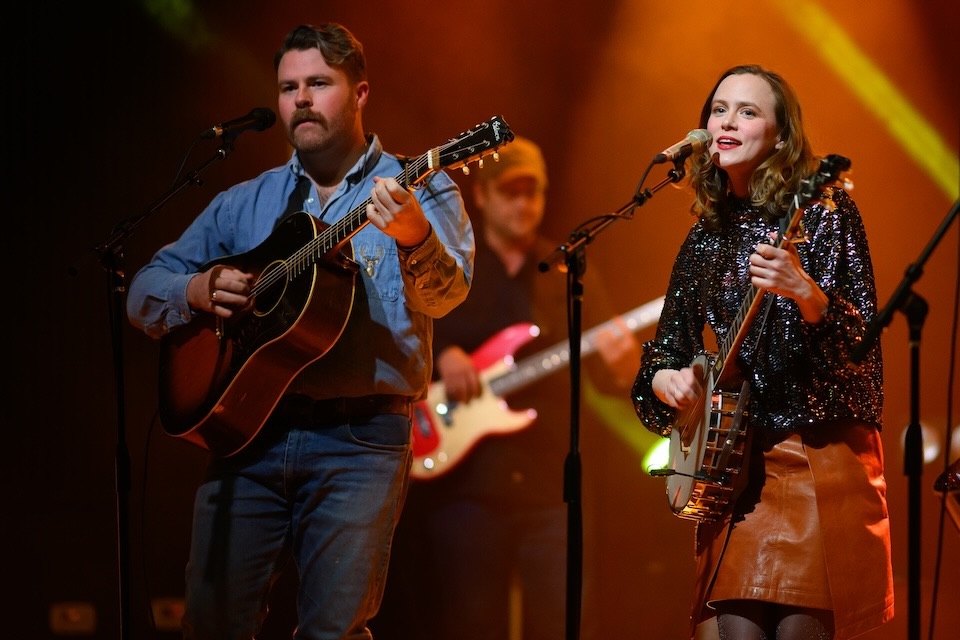
Chatham Rabbits in concert. Photo: Samuel Cooke.
Pier Carlo: As Austin said, you have a personality where you’re not afraid of inserting yourself. That’s a real challenge for a woman performer who does not have that quality.
Sarah: It is. And that’s why women need to take care of other women. We need to see, “Oh, OK, this is not an area that they shine in, and so I’m going to jump in here and introduce myself and bring her along.” Be an includer. I’m really obsessed with this idea of always put your shopping cart back, and if you see somebody by themselves or sitting alone, talk to them, make the conversation. We really try to do that with bands that we get placed with at festivals or an opener that we’ve never met before. Just be an includer. It goes such a long way.
Austin: I think something that’s very rarely talked about in the music world is that internally between bands and artists there can be a lot of competition. There’s support as well, but it is important, I think, as an artist to try to break that mold, whether it’s men, women, whatever genre, everybody that’s an artist. We’ve always believed that rising tides raise all ships. If something is going really, really well for a band in the Triangle that’s doing something similar to what we’re doing, then that means that we have the opportunity to step right in there and do well with them. That’s our mentality. It’s less of an or situation and a lot more of an and situation.
Pier Carlo: Is there anything you’ve learned about your songwriting and musicianship or the business side of things that you wish you’d known years earlier?
Sarah: I wish I had known that there are going to be seasons where creativity and words and melodies are going to come to you more easily in the moment and they’re just going to flow and it’s going to work. There might be weeks or months or even years in between those spurts, but it will happen. And that I don’t need to worry and fixate on that.
Then the other thing I would say is I am so glad that there is so much that we didn’t know, because being naive and oblivious allows you to not understand the way things should be and totally turn it on its head and surprise people, surprise yourself and go about things in an unorthodox way. And you’re not even trying to; you’re just trying to be an earnest person. So that would be my answer.
Austin: I think that is an incredible answer. I’m sitting down here in a different room nodding my head along. That’s so true. I think if we knew what we knew now, we wouldn’t be in this room doing this right now. And it’s not because we wouldn’t have wanted to. I think we would’ve gotten in our own way a lot. Sarah, when we started this, just picking up the phone and calling people out of the blue, it’s like she was treating it almost like a sales job, and we didn’t know any better. We didn’t know if you were supposed to have somebody represent you.
Sarah: I didn’t know that wasn’t cool. [She laughs.]
Austin: Yeah, we didn’t know anything. We truly didn’t. It was just so helpful because guess what? A lot of people, even managers and people that have been in the industry a long time, don’t know as much as they think they know either, because in this career, this job, there are so few structural boundaries. This is a business that has no pricing model. What does it really mean to price your music? Should we be getting paid $500 or $50,000 versus some other band? Who even knows? It’s all based on feelings. It’s like there’s really no structure for any of it.
Sarah: This is actually crazy.
Austin: Yeah, it is. And just another little interesting industry factor, an example of many things that are like this: The go-to model for management for a band right now is a manager normally makes between 10% to 20% of gross revenue for the band. That’s a standard for how it works. If you think about that for any other industry, it would be mind-blowing. If Coca-Cola is looking for a new CEO, and they say, “OK, we’re looking for a new CEO. The pay structure is this CEO gets paid 15% of Coca-Cola’s gross revenue, and they have absolutely zero accountabilities for expenses. They have no tangible objectives that they have to report to the board that they did to help Coca-Cola. They’re just this ambiguous figure that is running Coca-Cola, and they’re making hundreds and hundreds of millions of dollars.” It doesn’t make any sense in any other industry.
But in music, there’s these things that are true that just seem so odd for someone like me who came from financial planning. Trying to hold people in the industry accountable for the oddities that are involved is like playing Whac-A-Mole, and the moles are just constantly going underground and you’re just like, “Nobody can answer anything. This is wild.” [He laughs.]
Pier Carlo: But are you getting a sense that artists like you are hitting the mallet more successfully on the moles?
Austin: I think so. I think that this rise of DIY ... . The reality is you can pay a PR firm or somebody a zillion dollars and they can get you a bunch of good stuff, and all of it’s really helpful. Those people are needed. But if you get one viral video on TikTok that was free of you holding your pet turkey and running around your farm, that can make more of an impact than any of that other stuff. This DIY mentality of musicians now is really cool.
I think it takes both. I don’t want to totally discount the industry because the industry is really important, but also —
Pier Carlo: I love that you brought that up, though, because it’s another thing that makes a lot more work for the artist.
Austin: It does.
Pier Carlo: It used to be if you got the publicist, the publicist would do the heavy lifting. But now with social media, you are also expected to do the videos and do that kind of work. That takes a lot of time and energy out of your creation.
Austin: Yeah, I agree. I actually think a lot of bands would not have been as successful as they have been if they started at the same time that Sarah and I are starting. Because if you’re truly in it just for the music and just for the art, it is really, really hard to make it. Because the sort of cringe content world that we’re living in with social media, that stuff is really important, and if you don’t do it, you are going to be irrelevant in a lot of ways.
Pier Carlo: Do you enjoy it?
Austin: No. [He laughs.]
Sarah: I enjoy being on Instagram stories and talking directly to our fans, but as far as posting, we both hate it with a passion.
Austin: But you know what? If it brings people into the fold.
Sarah: We hate making videos of ourselves playing music. It’s so hard to do it and get the lighting, get the spacing, get the captions right. And then you upload it, and Instagram has a glitch and takes it down or something like that. It’s incredibly frustrating.
I wanted to just add one more thing to the piece about your question about, are artists getting better at Whac-A-Mole or hitting the moles? I think one thing that is changing or becoming more prevalent right now is that artists seem to be, in our experience, sharing more information, like what they’re getting paid for certain gigs, how they were treated at certain venues. Behind the scenes we’re being our own little union. I think that’s really important so we don’t get taken advantage of. Like Austin said, the fees for things are so arbitrary, and the structure is so bizarre. I think when artists talk about it, we make sure that, “OK, at this festival, we’re being fairly compensated.” I think that’s really cool.
Pier Carlo: Sharing that information is a little bit of that “rising tide lifts all boats,” the metaphor that Austin was talking about, putting an end to the competition.
Sarah: Totally.
Pier Carlo: Last thing: You’ve got a big, jam-packed tour scheduled for February and March. Would each of you name the one item in your suitcase or your van that can make all a difference on a long tour?
Sarah: I’ll go first. Austin, do you know what I’m going to say?
Austin: Yes, I know exactly what you’re going to say. How about we answer for each other?
Pier Carlo: Oh yeah. I like that.
Sarah: OK. Austin, you answer for me.
Austin: Sarah could not survive even in the dead of summer without her electric blanket.
Sarah: Yes! [She laughs.]
Pier Carlo: Even in the North Carolina summer?
Austin: I’m telling you, she curls up with that electric blanket on every tour for most of the time she’s in the bus. We have a solar-powered electric generator just to run her freaking electric blanket.
Sarah: I love that thing! It’s my comfort, and I just get under that and disassociate after a show. It’s just really great.
And, Austin, I would say something that you cannot live without on tour are your Crocs, because when you drive the bus, you got to have your comfy shoes.
Austin: Yeah, totally. I have to have my driving shoes.
Pier Carlo: Driving shoes. People used to wear driving gloves. You got driving shoes. That’s very cool.
Sarah: Oh yeah. This is what we mean when we’re like, “We’re not cool musicians. This is just who we are.” We got our electric blanket and our Crocs, so … .
December 30, 2024

